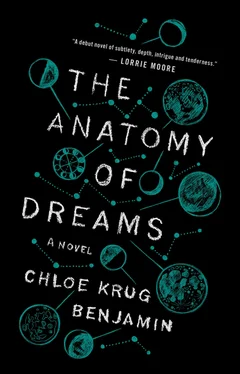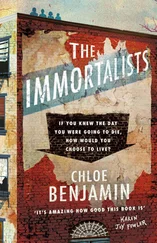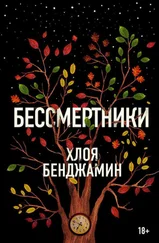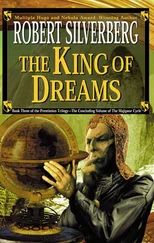Greetings, pals—
Janna and I’d be delighted if you’d treat us to your presence(s) on the eve of 25 November. We’ll give thanks, we’ll drink copious amounts of liquor, and, Janna willing, we’ll eat the appropriate troughs of food, American and otherwise. Come in your finest around the hour of five, post meridiem—and bring something to contribute, you lazy fucks.
Hugs—
T.
I read the letter twice in a row with a seeping feeling of delight. It had been years since I’d had a proper Thanksgiving meal—not since I lived with my family. Gabe and I had a halfhearted tradition of eating dinner at an ethnic restaurant, though I’d never really been sure whether we did it out of protest or laziness. Thom’s letter made me feel normal. We were the sort of young people who had neighbors, had friends; we would go to their house for Thanksgiving, and we would fall asleep, along with the bulk of the country, at the pathetic hour of seven thirty or eight, bloated and sewn-in as stuffed animals.
I decided to make a sweet potato dish, something roasted that I was sure I couldn’t mess up. After picking up the ingredients in town, I stopped at the Goodwill on State Street. Keller paid us fairly well—even better now that we worked for the university—but I was my mother’s daughter, and most of it went into savings. Usually, I was attracted to clothes in muted colors, though perhaps attracted is the wrong word; it was more that I knew these were the styles that suited me and I had resigned myself to our partnership. Today, though, I wanted something different. I brought home a suede skirt in a rich and dusty orange and paired it with a low-backed black top; as I closed the bedroom window, cool air brushed my spine. When I added the little gold hoops Gabe had given me for my twenty-third birthday and a pair of bronze heels, I felt almost unlike myself.
“You look great,” said Gabe, in a tone I tried not to take for surprise, as he came downstairs to meet me. He had dressed up, too: he wore a starched navy shirt and a skinny green tie with his Chucks.
“So do you,” I said. Had he gotten a haircut, or was the structure of his face always so clear—the sharp jaw, the deep-set and crinkled hazel eyes?
As we crossed the lawn to Thomas and Janna’s house—a bottle of wine in Gabe’s hand, the sweet potato dish in mine—we could have been any young couple. We rang the doorbell and waited on the porch, Gabe’s sneaker tapping the planks.
Janna opened it. Her hair was newly streaked with purple and pulled into a bun, so that the stripes collected in a clean knot at her crown. She wore an orange dress, too, but hers was the neon color of construction signs. It ended in a feathery skirt at her hips. Beneath it she wore sheer brown tights and no shoes.
“Oh, look!” she said, clapping. “You’re the same color as your potatoes!”
I looked down; it was true. She kissed Gabe twice, once on each cheek.
“Come in, come in,” she said. “I’ve got to attend to the table, but Thomas will get you a drink.”
With this she whirled out of the kitchen, and Thom sauntered in from the living room. The oven was releasing small curls of smoke. Thom paused in front of it and stared quizzically at its dials before turning to us.
“Hello, friends,” he said. “What can I get you? Wine? Martini? Gin and tonic?”
“Gin and tonic, please, sir,” said Gabe.
“Sylvie.” Thom grinned, putting a warm hand on my shoulder. “You match your potatoes.”
“I know,” I said. “Janna mentioned—”
“Extra,” said Janna, sweeping back into the kitchen, a butter knife in one hand. “Silly me—I set the table for five.”
She sniffed and turned, with razorlike precision, to the oven.
“The oven , Thomas,” she said. “The oven is smoking , darling.”
She turned off the heat at the same time as she opened the silverware drawer next to it. After dropping the extra knife, she slid her hand into a bright blue mitt and pulled out a tray of beautiful, scallop-edged orange cups with little mounds of sweet potato inside.
“Oh,” I said. “If I’d known you were making sweet potatoes, I wouldn’t have brought them. But yours are gorgeous. How did you make them?”
“Easy,” said Janna, licking a bit of potato off her ring finger. “You cut the oranges in half and scrape out the insides. Fill them with mashed potatoes, throw the pulp in the trash.”
She wiped her hands on a towel and looked at us brightly.
“Hungry?” she asked.
• • •
I don’t remember much about dinner, only that we were woozy with drink by the end of it: first the gin and tonics, then two bottles of rich red wine, a post-dinner espresso splashed with bourbon. The moon rose baldly into the sky; Gabe took off one of his shoes and threw it behind his head, where it collided with an antique mirror that cracked into a delicate, spidery web and, Janna claimed, looked better now than it had before. At some point, we collapsed on the couch in their living room, a tangle of legs. I looked for the Keats book, the mossy old tome that Thom had shown me weeks before, but it was gone. Thom was singing something— Oh my darling, oh my darling, oh my darling Clementine. You are lost and gone forever . . . Did I imagine that at some point, Janna’s head rested against my chest? I don’t know how or why it would have happened, but I remember the warm sun of her skull, the streaks of hair that spread across my shoulders like purple kelp, her spindly fingers picking at the fabric of the couch.
It must have been one or two in the morning when we stumbled out the back door to their yard. It was a gorgeous night, unexpectedly warm. I can still see Thom running back to us, gazelle-like, all legs—he’d gone somewhere and returned with boxes of bang snaps. We threw them at the ground and yelped when they exploded too close to our feet. Gabe and I kissed pressed against the fence, dense and urgent, his hands beneath my shirt. How long had it been since we had kissed like that? And then he was gone, and I was sitting with Thom beneath the juniper tree in their backyard, a tree with a thick, warped trunk like a dish towel being wrung.
If my memories up until this point are imagistic and uncertain, here they sharpen. Here I remember not only sensory details—the leathery leaves and sharp little sticks beneath my legs; grass stains on the lap of my dress; Thom’s sweet alcoholic scent—but whole stretches of conversation. Where were Gabe and Janna? I don’t remember caring; I leaned against the juniper, its trunk kneading my back.
“. . . the first man I ever loved,” Thom said, his nose bulbous and jagged in the blue light. “Platonically, I mean—but I did love him. I admired him so much I felt my identity bleeding into his, little by little. Have you ever had a teacher like that?”
“No,” I said, whether or not it was true. An owl cooed in the distance.
“No? Ah,” said Thom. “Well, he was my first poetry professor. My first real professor. And Janna was his pet.”
“He liked her poetry?”
“He liked— Well.” He laughed, high and breathless. “You’re a dear, Sylvie—you know that, don’t you? You’re a very sweet girl. But inside you there’s a sour center. And that’s why I like you.”
Why that flattered me I can’t say now. It was the alcohol, I think—the scent of the muddied leaves, Thom’s voice sure as an incantation.
“Not that I’m exempt,” he said. “I’m as dirty as they come. And I’m disgusted by it now. But, you know—I was so damn idealistic then. The art! That’s what I thought was most important. He was the writer-in-residence at our college. I’d never met a man who was brilliant in the ways he was brilliant. And I thought I could access him, if I was with her.”
Читать дальше












